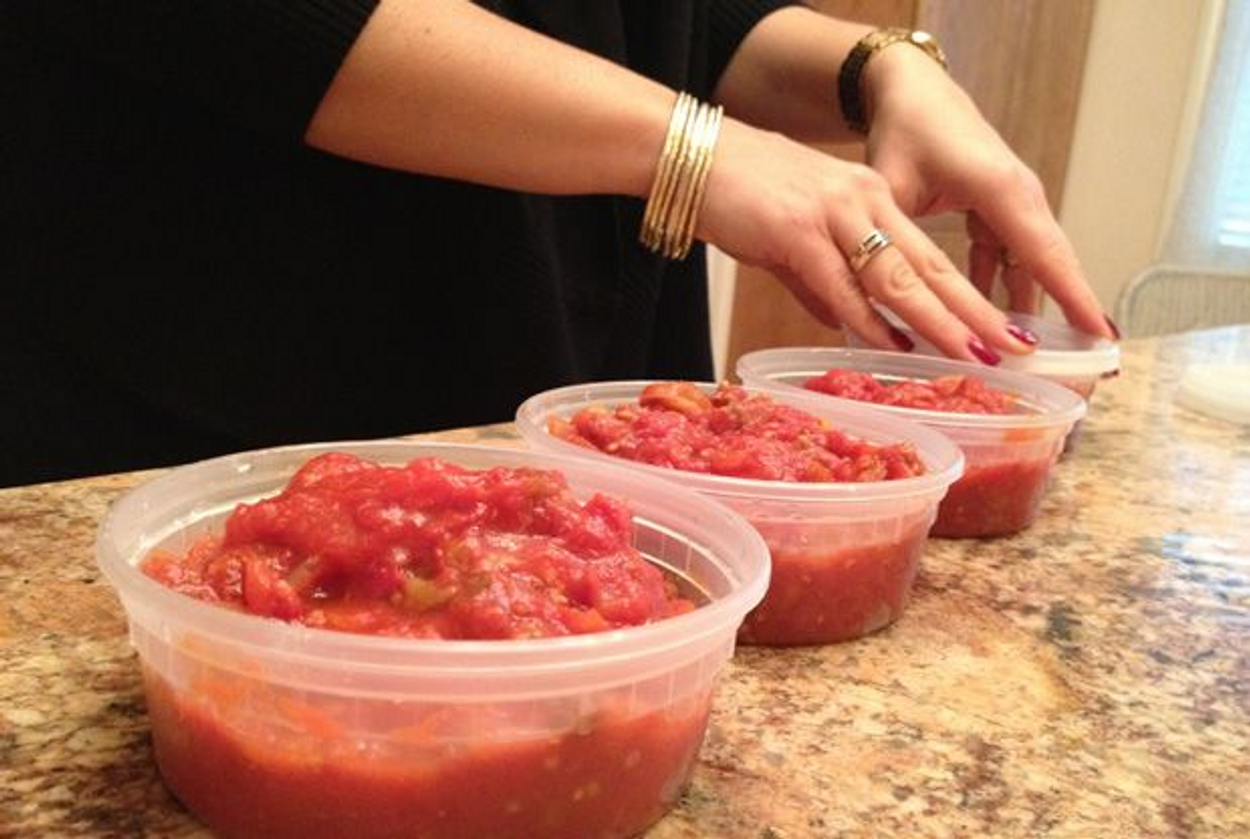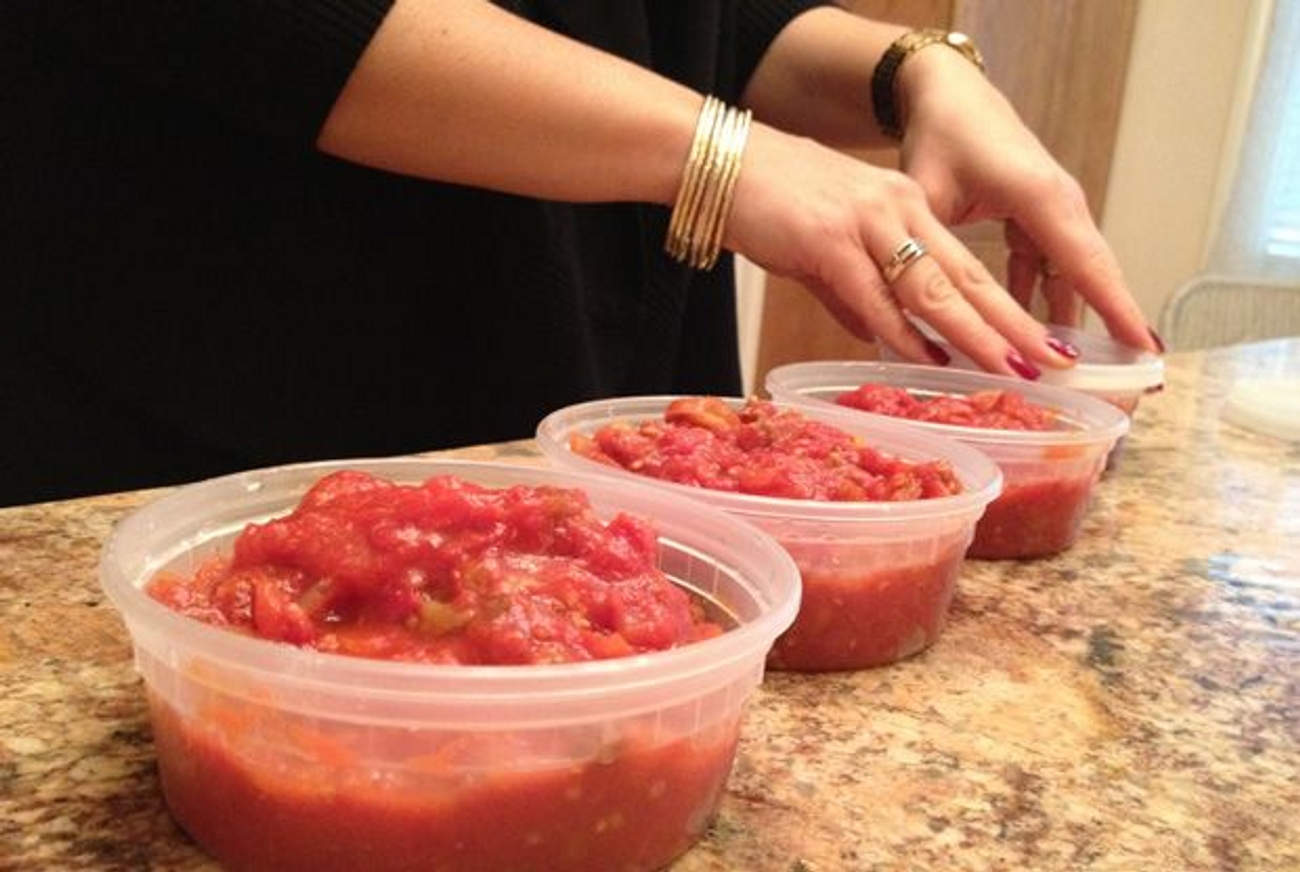How To Cook Like a Syrian: Making My Mother’s Matbucha
I never wanted to learn to make my mother’s matbucha, a savory eggplant salad–until I became a mom-to-be




When Irv and I faced each other under the chuppah three years ago, I thought about my role as his wife. I was ready to assume some of the responsibilities that came with the title “Mrs.”—like standing in synagogue when Irv went up to the Torah, and visiting the mikveh every month. But I didn’t want to put on the pink, frilly apron my friends gave me at my bridal shower and spend hours doing what my mother called “kitchen duty.”
Cooking, my mother taught me, was an essential part of being a Syrian Jewish wife. But as a new bride, I discovered a secret life beyond the kitchen—a life my mother never told me about. Instead of schlepping home bags from Syrian grocers in Brooklyn, I spent my evenings with girlfriends at happy hour in Manhattan and ordered takeout dinners on Seamless.com. Irv encouraged my rebellious behavior, excited to have an adventurous and independent woman on his arm.
And he still got the home-cooked meals that men have long come to expect from their Syrian Jewish wives. He just got them from my mother. Whenever I would visit, she would drop a jar of her savory matbucha, the warm tomato and eggplant salad that’s central to Syrian cuisine, into my bag. “For your husband,” she’d tell me, her tone implicitly disapproving of the fact that I hadn’t cooked it myself, the way a proper Syrian wife would. “Irv loves matbucha.” When I’d get home, Irv would twist off the cap and dunk a tablespoon into the chunky red mix. “Mmm,” he’d say with total sincerity, hoping his independent wife might at least take the time to use the kitchen once in a while. “I can’t wait for you to cook like your mom.”
Before he met my mother, Irv’s Lebanese taste buds only sampled store-bought matbucha. It lacked the freshness and authenticity of matbucha cooked in a Syrian kitchen, and so my mother’s won over his heart. As he ate every last bite, I would think to myself: I love eating it, too, but there’s no way I’m going to cook it—sautéing eggplant, peppers, and crushed tomatoes until our apartment smells of matbucha.
But that all changed eight months ago, as I watched two pink lines spread across the screen of a home pregnancy test. I had weaseled my way out of cooking for Irv, but my baby squirmed inside whenever my mother slipped matbucha into my purse. The little Syrian Jew inside me wanted my mother’s cooking, just like its dad. And this time I couldn’t say no.
I loved growing up in Brooklyn, just blocks from where my great-grandparents settled after leaving Aleppo in the early 1900s. I loved Friday nights—a time of relaxation for my three siblings and me in our Modern Orthodox home. I loved the smell of warm white rice and lemony grape leaves that my mother made every Shabbat. I loved fighting for the seat next to my dad at the head of the table. Sometimes I wondered if my mother felt neglected, but she would get her time with me soon afterward.
I hated that part.
Once the six of us finished eating and the ceramic plates were littered with olive pits and challah crumbs and smeared with matbucha, my brothers and my dad headed to the couch. My sister and I followed my mom to the kitchen. We scooped leftover chunks of matbucha from small glass bowls into Tupperware and stacked the crusty dishes by the sink. My mother scrubbed them clean, her gold bangles clanking together as her arms moved back and forth. Her cooked salad defined our Shabbat table—as it did for many holidays and family gatherings—but it made for a miserable cleanup. Kitchen duty, I decided from a young age, was not for me.
And it didn’t have to be. My mother flipped pancakes on weekday mornings, packed turkey sandwiches on pita bread for me to take for lunch, and had lentil soup waiting for dinner. By the time I started college, I’d never even boiled a pot of pasta. And when I left her house to become Irv’s wife, my prayers under the chuppah were answered. Now my mother cooked for both me and my husband. And any guilt I felt for disappointing her—or Irv—quickly disappeared as I got to enjoy both her food and my freedom.
I knew one day she would cook for my children, too—and happily, too, as their grandmother. But the thought of that eventually caused me tremendous guilt. What kind of mother would I be if I didn’t provide the comfort of homemade meals, the warmth that Syrian cooking aromas brought to the home?
The Syrian Jewish community, which numbers more than 60,000 in Brooklyn alone, holds on to a past over 5,000 miles and 100 years away. When the first immigrants moved from communal villages in Aleppo to Manhattan’s Lower East Side in 1919, their olive-colored skin, Arabic language, and spicy, tangy foods set them apart from the Eastern European Jews who lived in the neighborhood. The Syrians adopted Western dress, learned English, and settled on Ocean Parkway in Brooklyn. But one aspect of Aleppan life—food—stayed the same. For my family, this meant matbucha. Savta Elana, my grandmother, fried the eggplant, while my mother baked it, but either way, the red salad always had its spot on the table.
I needed matbucha to have a spot on my own table. The future of my people—the future of my marriage and my Jewish child-to-be—depended on it. I called my mother and asked for her recipe. She proudly listed the ingredients.
Friday afternoon was not the best time to start.
I had attempted to make my mother’s matbucha for Shabbat, but so far all I had was a stovetop splattered with tomato sauce, and frizzy hair that reeked of fried onions. I left the high flame unsupervised and the tomatoes burnt into solid, black crisp on the bottom of the pan.
With three hours to go until candle lighting, I knew my mother’s matbucha was already garnished with a couple of parsley sprigs and ready to grace her table. I looked over at the sliced eggplant rounds about to become part of my experiment, their slimy juices absorbed by a paper towel underneath them. As I heard the crackling of a burning onion and I watched smoke rise from the pan, I realized that tradition had stopped cold in my home. I wondered why my mother’s kitchen never resembled my own at the moment. And how come her hair never smelled like onions? I dialed my mother.
“Boil some cinnamon, Paulette,” she said, her favorite trick for cutting down on kitchen odors. “Who sautés an onion without it?”
I filled a pot with water and ground cinnamon and waited for the sweet scent to mask my failure. I pulled a Tupperware of my mom’s matbucha from the freezer. It would defrost just in time for Irv’s arrival. I felt relieved I hadn’t told him what I set out to do that day. At least only I knew how dire the situation had become. As I lit the candles that night, I prayed I would find fulfillment from kitchen duty. My cabinets overflowed with my mother’s Tupperware, and I feared she would soon send me home with baby food, too.
The following Thursday, I decided to trek back to my mother’s home, where I knew she would already be preparing for Shabbat. As I turned onto her block, she waved from the porch and blew kisses like she used to when I stepped off the school bus. I followed her through the living room where she once spent evenings helping me with homework, through the dining room where we lit Shabbat candles together, and into the kitchen where she taught my siblings and me a new vocabulary word over breakfast each morning.
“Let’s begin,” she said. Her bangles clanked together as she tossed me an apron.
We spent the next few hours dicing and stirring eggplants and tomatoes into her masterpiece. She gets so much joy from this, I thought. Joy from cooking, but also joy that I need her even as a grown, married woman. It’s how she raised me. I looked down at my baby bump and hoped I would do the same. I might not ever be the perfect Syrian Jewish mother, but I would always be something even luckier: the daughter of one.
My Mother’s Matbucha, from Paulette Safdieh’s mother, Tally Grazi
1 eggplant
4-5 peppers (yellow, orange, and red)
1 onion
1 can of Redpack crushed tomatoes
2 garlic cloves
Salt, pepper, and crushed red pepper to taste
Peel the eggplant, cut into rounds, and sprinkle with salt. Let sit on paper towel for 45 minutes, then pat dry. Place eggplant on greased cooking sheet and spray top of eggplant with cooking spray. Bake for 20-25 minutes at 350 degrees. Cut eggplant into small pieces.
Sauté an onion and crushed tomatoes. Add eggplant, diced peppers, and garlic. Add salt, pepper, and crushed red pepper to taste. Let cook for 45 minutes.
Serve warm, alone or with challah.
Yields four servings.
Paulette Safdieh is a New York-based writer expecting her first child in April.